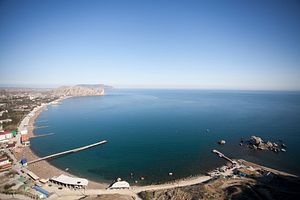Three years ago this Saturday, Russia formalized the first forced annexation Europe has seen since the Second World War. Stating that “Crimea has always been an inseparable part of Russia,” Russian President Vladimir Putin laid claim to Ukraine’s southern-most peninsula. Moscow pointed to a faux “referendum” held two days prior as justification — a vote that saw Russia claim 97-percent support for annexation, and which was monitored by neither UN nor OSCE officials. Simultaneously inflating Russia’s geographic reach and near-pariah status, Moscow’s claim of annexing the peninsula presented its foremost attempt to date to gut the post-Cold War order.
Russia remains in firm control of the peninsula, with the likelihood of returning Crimea to Ukrainian authorities as negligible as any point since early 2014. Such control has paralleled increased disappearances of Crimean Tatars and a remarkable drop-off in civil liberties, with Crimea now the sole stretch of Ukraine ranked as “Not Free” by Freedom House (with whom I’ve worked in the past). Such rights refusals matter little to Moscow, which has increasingly leaned on the Crimean annexation for legitimacy, buffeted as the Kremlin’s been since by the longest recession Putin has yet overseen.
But thirty-six months on, Crimea has presented a test case for a distinctly 21st-century question: When is an annexation not actually an annexation? That is, if a country claims to annex a certain swath — be it Crimea, or a scattering of islands in the South China Sea — and such claims aren’t met with mutual recognition elsewhere, is this actually an annexation or a simple, and perhaps more traditional, occupation?
As we ring in the anniversary of Moscow’s claims, it’s worth looking at which countries, if any, have supported the Kremlin’s moves in southern Ukraine. A trio of states initially announced that the Russia-backed Crimean “referendum” presented a free and fair reflection of Crimeans’ desires for annexation: Kazakhstan, Kyrgyzstan, and Afghanistan. Interestingly, Kazakhstan — where President Nursultan Nazarbayev became the only world leader to join Putin in describing Ukraine’s 2014 revolution as a “coup” — later attempted to walk back its recognition, unceremoniously removing its statement of support from its Ministry of Foreign Affairs website.
Shortly thereafter, ten additional nations joined Russia in opposing a non-binding United Nations resolution supporting the territorial integrity of Ukraine. Those backing Moscow, like those propping the Crimean “referendum,” were a mixture of autocracies and client-states: Armenia, Belarus, Bolivia, Cuba, North Korea, Nicaragua, Sudan, Syria, Venezuela, and Zimbabwe. None of these states appear to have commented on Crimea in the years since; save Belarus, where President Aleksander Lukashenko, mired in his latest spat with Moscow, recently noted that “fraternal Ukraine is fighting for its independence.” Not exactly a round of resounding, continued support for Moscow’s claim to southern Ukraine.
As Russia rings in the third anniversary of its entrenching occupation of Crimea, it can point to one-off rounds of support from regimes in Khartoum, Pyongyang, and Damascus — not exactly geopolitical stalwarts — and mealy-mouth, conditional support from nominal allies in Astana and Minsk. Likewise, any hopes of a new administration in Washington recognizing the Kremlin’s claims to annexation appear to be fizzling by the day. Just this week, the State Department said that “Crimea is part of Ukraine.”
So, yes: Russia can repeat that it has annexed Ukraine’s southern peninsula, a step beyond prior moves in Abkhazia or South Ossetia. (None of the Pacific states that backed Russia’s territorial carving of Georgia — Tuvalu, Vanuatu, Nauru — have made any noise about supporting Russia in Crimea.) But the Kremlin’s efforts haven’t led to a renegotiation of the post-Cold War order, nor to a territorial reordering in the post-Soviet space. Three years on, it’s clear that claims of annexation do not necessarily an annexation make, especially if the only regimes joining you are predominately pariah states with nothing else to lose.

































